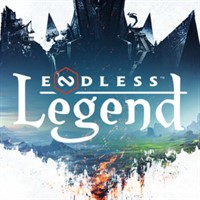Endless Legend: Exploration
Last update:
An example range of vision. The cliff stands in the way, the slope does not. If a military unit was to stand on the cliff, they would be able to see what is below.
Cliffs and high hills limit range of vision. If you are marching at the foot of a hill, you cannot see what is at the peak. During the exploration, it is better to travel over hills and watch over the area from there. Especially that hills may form a natural maze, which makes exploration more difficult.
There are two types of fog of war. The first one covers the undiscovered regions and the other one, veils the discovered areas, where there aren't any of your troops or buildings. While determining long marching routes, for the first type, the game moves blindly. This means that you may run into a sea, along your path, which you will be informed about right before you do. This is why it is better to take baby steps, o you can turn around and retreat, if necessary. While marching over an area already discovered, the game will choose the most optimal route for you.
The game highlights the boundaries of the region that you roll your mouse over. It also happens, when a part of the area is hidden under the fog of war. take that into consideration, while determining the marching route. Thanks to this, you will avoid wasting movement points
Toy learn the name of the region only after you explore its central part. It is easy to find the center, if only you set the camera back, roll the mouse over the region and find out, which part yet remains to be explored. This trick is especially useful in the case of the region of irregular shape, e.g. elongated.
Note the shape of the terrain under the fog of war. You will quickly realize that water is marked differently than land. Hills and the other elevations should also be easy to recognize. This will also allow you to determine the shape of the region, without the necessity to explore it in fully.
Always save the game before exploring ruins. Sometimes, instead of Dust or luxury resources, you can find there a big group of enemies that you will have to fight with. On other occasions, you will receive a time-consuming quest, or one that is impossible to complete at that moment. For example, while playing on the isles, you can receive a quest to explore some other ruins on an island farther away. Without entering the second era, and discovering Sea Travel you will not be able to get there, which may set you back by several tens of turns and a chance that the quest will be deemed not completed.
Bribery is better than negotiations, negotiations are better than fighting. The cheapest villages to bribe cost 40 Dust, which is a low cost, even at the beginning of the game. Negotiations are very random, in nature,. Sometimes you will receive a simple task, some other time you will be able to complete it in the 100th turn. What is even more, you cannot negotiate with two villages at the same time so, it may happen that you will get stuck with a quest that is too difficult.
Fighting villages is good for the beginning, when the number of defenders is low. Later on, however, there are too many. Fight whenever your army is at an advantage in numbers or in strength, or when you play as Necrophages. Otherwise, it is better to bribe villages.
Try not to set soldiers apart. Single units can easily fall victim to traveling bandits. A reconnaissance army should be two units strong, at least. For the reason of safety.
You are not permitted to copy any image, text or info from this page. This site is not associated with and/or endorsed by the developers and the publishers. All logos and images are copyrighted by their respective owners.
Copyright © 2000 - 2026 Webedia Polska SA for gamepressure.com, unofficial game guides, walkthroughs, secrets, game tips, maps & strategies for top games.
